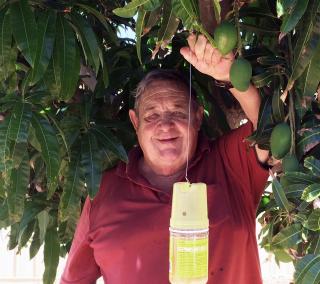A pilot of new techniques to control and eradicate fruit fly is off the ground, with resounding support from Carnarvon’s town community and horticultural industries.
The Department of Agriculture and Food pilot is based on the sterile insect technique, and uses an improved strain of male-only Mediterranean fruit fly (Medfly), sterilised by x-ray in the department’s South Perth rearing facility.
Large-scale release of the sterile fruit flies in Carnarvon, commencing mid-2016, aims to overwhelm the wild male population and outcompete to mate with wild females, which will produce infertile eggs.
Department Medfly community engagement Sandy Leighton, who is responsible for community liaison and on-the-ground biosecurity activities in Carnarvon, said industry and community stakeholders had embraced the pilot.
“In an effort to educate and engage town residents in our biosecurity activities, free Cera traps were offered via the local Carnarvon Notice Board Facebook page, which has more than 3,200 friends,” Ms Leighton said.
“The post was popular and the result instantaneous, with more than 15 residents volunteering for over 40 Medfly traps to be installed on their properties.
“Since October 2015, more than 50 Carnarvon town residents have received more than 220 traps.
“In addition to attracting and destroying Medfly in home gardens, this offer of free traps gave me an opportunity to chat to residents one-on-one about the damage Medfly inflict on local fruit and vegetable produce, and our eradication efforts across the town, hobby farms and plantations estates.”
Medfly is a serious pest of a range of cultivated fruits and some fruiting vegetables, such as capsicum and chillies and, for many fruit and vegetable crops Medfly is a key barrier to access to higher-value markets in Australia and overseas.
To ensure the success of the Gascoyne’s horticultural industries, the department works with industry stakeholders, local government and the Carnarvon community to boost biosecurity.
Ms Leighton said before rearing, sterilising and releasing male Medflies in Carnarvon, her focus had been on engaging horticulturists and town residents to reduce fly numbers to lower levels.
“The local industry is well-coordinated; the Carnarvon Growers’ Association is carrying out baiting and its effectiveness is being monitored fortnightly by department staff via a grid of 50 traps,” she said.
“I’ve been working with town residents and industry growers on maintaining good orchard hygiene to prevent large numbers of flies breeding on fallen, unpicked or rejected fruit and fruiting vegetables, as this is critical to the success of the program.
“All plantations in the area have been surveyed in order to identify and map fruit fly hosts to target for large-scale sterilised Medfly release when it commences mid-year.”
Flies will initially be released once weekly, via an innovative, custom-built Medfly blower, and will increase to twice-weekly later in spring and summer when many hosts, such as mangoes, are fruiting.
The pilot of new techniques to control and eradicate fruit fly is part of the department’s Boosting Biosecurity Defences project, made possible by Royalties for Regions, and supported by Horticulture Innovation Australia.

Media contacts: Jodie Thomson/Dionne Tindale, media liaison +61 (0)8 8368 3937
